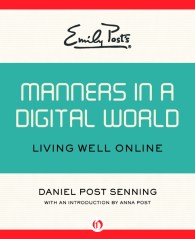
For nearly a century, the name Emily Post has been associated with the apparatus of etiquette and civility—which guidelines are sorely missing in our daily digital discourse. Charting these these unfamiliar waters for the Millennial Generation is the work of her great-great-grandson, Daniel Post Senning, author of the forthcoming book Emily Post’s Manners in a Digital World: Living Well Online (Apr. 16, in e-book and paperback). He talked to TIME about how the book came to be, why etiquette still matters, and how to end that annoying e-mail chain.
How did you become the Post family’s digital guy?
For a hundred years ‘Emily Post’ has answered all her correspondence. With the Internet, we had an online service that offered people to submit a question—because it was so much easier for people to do that online, the volume of the questions went up. I had this radical idea that we would be well served by having a Q&A forum.
That was where my role as the tech person at the Emily Post Institute really began. And right around the same time, we were writing the 18th edition of Emily Post’s big book of etiquette, which has been in publication ever since it was first written in 1922. One of the questions about this major rewrite was whether we should have a new-technology section.
It became really apparent early in the editing process, that we weren’t going to be able to sequester or isolate that content. The major life events that draw people to Emily Post were all being impacted by new technology. It was really obvious to us that we needed to dedicate a book to this new material.
What is it about this new material that makes it particularly tricky?
Our working definition of etiquette at the Emily Post Institute is that etiquette happens any time two people are relating. It’s all about the expectations we have of each other, and the ways that we take each other into consideration when we think about what we do and how we behave. New communication is inherently fraught territory.
But the basic courtesies still apply? How you handle email is not so different that how you deal with snail mail.
Absolutely. It’s one of the places where the multi-generation family business helps with a certain perspective, in that every generation witnesses the changes that occur in manners over a lifetime, and thinks that society’s in decline. It’s an unfortunate truth for some, but there’s also good news in that there are constantly new manners that are coming into being. Fundamentally, the basics of treating each other well stay the same.
(MORE: From Blog to Book: Kelly Oxford Talks About the Latest Chapters in Her Life)
Who do you think is the audience for the book?
I think of it as a reference book for the general user. We say it’s good for technophiles and “noobs.” Occasionally, it strays closer to the how-to category but we really worked on keeping our advice as broad as we could. Taking aim at the Internet or talking about social media, particularly in book form, is so tricky. It moves so fast.
I noticed that it’s much broader than the big book of etiquette, which offers such specific advice for specific situations, like how you invite an ambassador to dinner. What’s behind that change?
The nature of how new this new technology is. At the same time, I make an effort to do those little sample scripts whenever we can. What do you say when your boss sends you a friend request on Facebook? We try to find the specific examples that we are hearing repeatedly and get them in there as much as possible. But we don’t yet have 100 years of getting asked those questions.
Is there a general trend away from formality that comes from life online?
I think it’s an absolute pendulum that’s constantly swinging back and forth. Believe it or not, I almost feel like we’re on a swing back toward a little more formality. One of the things I like to say is that in an increasingly casual and informal world, we’re all asked to make more choices about what’s appropriate.
Knowledge of what that formal standard is really empowers everyone, even those who are committed to their casual culture, to make good choices. Part of the heart of our work is bringing some intentionality into the actions that we use with each other—and if not intentionality, good habits.
Is there any area of online etiquette that trips you up, personally?
We give we often say the worst vice is advice. Being in the advice business is a humbling experience in many ways. A piece of advice that I often give people is to make sure your online resume has some polish; my LinkedIn resume is not to 100 precent completion.
And something that was transformative for me when I started working here was that when we talk about foundational principles we use to guide us, we talk about consideration, respect, and honesty. I started noticing the little white lies that I would tell. It’s interesting, erasing that tendency to embellish, even for someone else’s benefit, or to smooth over a situation. I don’t tell people I never lie anymore, because that wouldn’t be entirely true.
(MORE: Book Publishing’s Latest Success Still Has to Do Her Homework Every Night)
Here are a few questions from our readers and from around our office. Is it acceptable to acknowledge something on Facebook by “liking” it even if you don’t actually like the thing?
Short answer, yes. The redefining of words by Facebook has been problematic for many. Common words, words that we’re really familiar with like “friend” and “like,” have a slightly different connotation. The context is that people are sharing more and more bad news online. And in some ways I like this. I think it’s a little more generous, a little more honest. But it’s a hurdle for many people. And if it makes you uncomfortable I’d say there’s no need to “like” anything.
How should you deal with different people preferring different forms of communication?
Help people, because we do have so many choices, make the choices that are good for you and good for them. If you’re conducting your business via email and that’s where you have a timeframe that’s reasonable, when someone texts you business, text them back and say you usually handle your business through email.
What’s the best way to end an email exchange when it gets to the annoying back-and-forth phase?
Magic words are magic. One of the best ways to get out of any situation is to thank someone for their time. The slightly longer version of that is that you don’t need to thank someone for a thank you.
What do you say to people think that the internet is so new and evolving that it’s impossible to issue etiquette rules?
We say etiquette is a combination of manners and principles. The manners are time-, location-, and culture-specific. There are certain things that we think are the heart of good etiquette, and we talk about those three principles of consideration, respect and honesty. The manners that express them change over time, particularly with a radical change in our whole communication environment, but the heart of good etiquette I think has stayed the same.


